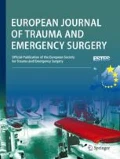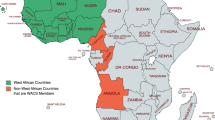Abstract
Background
With over 2 million certified physicians worldwide, the Advanced Trauma Life Support (ATLS) program is one of the most successful international medical education programs. Germany joined the ATLS program in 2003. Before implementation of the program, there was a controversial discussion as to whether a country like Germany with a long history of trauma care needed ATLS at all. 197 courses with nearly 3,000 providers were performed until December 2010.
Aim
We assessed the course evaluations since the implementation of ATLS in Germany using the participants’ systematic feedback.
Method
During the course, each participant evaluated each presentation, skill station, and simulation on a rating scale from 1 to 4 (1 being the best, 4 being the worst). The participants completed the evaluation forms during the course and before they received their results. The course coordinator made sure that all forms were returned. The feedback forms were collected anonymously and were entered into a database. Statistical analysis was performed using frequencies and mean values.
Results
The cumulative evaluation of all courses revealed an average performance score of 1.39 (1.06–1.86; n = 197). The lectures, skill stations, and simulations were individually evaluated as follows: lectures 1.61 (1.00–2.81; n = 197), skill stations 1.40 (1.00–2.40; n = 197), and surgical skill stations 1.35 (1.00–2.38; n = 197). Practical skills simulation (case scenarios) received the highest grade of 1.24 (1.00–1.57; n = 197). There were no significant changes during the time concerning the results of the evaluation.
Conclusion
The overall assessment showed constantly good and excellent evaluations by the participants over the years. In general, skill stations and simulations performed better than lectures. According to these results, the course format is well accepted by the participants and, therefore, can be recommended to all physicians treating trauma patients. Our results also underline the value of such a course format in an industrial country with an already established trauma system.





Similar content being viewed by others
References
Ali J, Adam R, Butler AK, Chang H, Howard M, Gonsalves D, et al. Trauma outcome improves following the advanced trauma life support program in a developing country. J Trauma. 1993;34(6):890–9.
Bouillon B, Kanz KG, Lackner CK, Mutschler W, Sturm J. The importance of Advanced Trauma Life Support (ATLS) in the emergency room. Unfallchirurg. 2004;107:844–50.
Esposito TJ, Copass MK, Maier RV. Analysis of surgical participation in the Advanced Trauma Life Support course. What are the goals and are we meeting them? Arch Surg. 1992;127:721–6.
Helm M, Kulla M, Lampl L. Advanced Trauma Life Support. A training concept also for Europe. Anaesthesist. 2007;56:1142–6.
Davis JW, Hoyt DB, McArdle MS, Mackersie RC, Eastman AB, Virgilio RW, et al. An analysis of errors causing morbidity and mortality in a trauma system: a guide for quality improvement. J Trauma. 1992;32(5):660–6.
American College of Surgeons Committee of Trauma (ACSCOT). Advanced Trauma Life Support (ATLS) for doctors. 8th ed. Chicago: American College of Surgeons Committee of Trauma (ACSCOT); 2008.
Sturm JA, Lackner CK, Bouillon B. Advanced-Trauma-Life-Support-Programm (ATLS): Ist das Schulungsprogramm zur Verbesserung der Schwerverletztenversorgung im Schockraum noch aktuell? Trauma Berufskrankh. 2004;6:S146–8.
Sturm JA, Lackner CK, Bouillon B, Seekamp A, Mutschler WE. Advanced Trauma Life Support (ATLS). Unfallchirurg. 2002;105:1027–32.
Schweiberer L, Nast-Kolb D, Duswald KH, Waydhas C, Müller K. Polytrauma—treatment by the staged diagnostic and therapeutic plan. Unfallchirurg. 1987;90:529–38.
Bishop M, Shoemaker WC, Avakian S, James E, Jackson G, Williams D, et al. Evaluation of a comprehensive algorithm for blunt and penetrating thoracic and abdominal trauma. Am Surg. 1991;57(12):737–46.
Ruchholtz S, Zintl B, Nast-Kolb D, Waydhas C, Schwender D, Pfeifer KJ, et al. Quality management in early clinical polytrauma management. II. Optimizing therapy by treatment guidelines. Unfallchirurg. 1997;100(11):859–66.
Styner JK. The birth of Advanced Trauma Life Support. J Trauma Nurs. 2006;13(2):41–4.
American College of Surgeons (ACS). Quality assurance in trauma care. Chicago: American College of Surgeons (ACS); 1985.
Townsend RN, Clark R, Ramenofsky ML, Diamond DL. ATLS-based videotape trauma resuscitation review: education and outcome. J Trauma. 1993;34:133–8.
van Olden GD, Meeuwis JD, Bolhuis HW, Boxma H, Goris RJ. Clinical impact of advanced trauma life support. Am J Emerg Med. 2004;22:522–5.
Scharplatz D, Sutter PM. 5 years ATLS (Advanced Trauma Life Support) courses in Switzerland. Swiss Surg. 2003;9:263–7.
Styner JK. The birth of Advanced Trauma Life Support (ATLS). Surgeon. 2006;4(3):163–5.
Ali J, Adam RU, Sammy I, Ali E, Williams JI. The simulated trauma patient teaching module—does it improve student performance? J Trauma. 2007;62:1416–20.
Anastakis DJ, Regehr G, Reznick RK, Cusimano M, Murnaghan J, Brown M, et al. Assessment of technical skills transfer from the bench training model to the human model. Am J Surg. 1999;177:167–70.
Anastakis DJ, Wanzel KR, Brown MH, McIlroy JH, Hamstra SJ, Ali J, et al. Evaluating the effectiveness of a 2-year curriculum in a surgical skills center. Am J Surg. 2003;185:378–85.
Carley S, Driscoll P. Trauma education. Resuscitation. 2001;48:47–56.
Carrico CJ, Gann D, Holcroft J. Guidelines for trauma care fellowships. J Trauma. 1992;33(4):491–4.
Hogan MP, Boone DC. Trauma education and assessment. Injury. 2008;39:681–5.
Kennedy DWG, Gentleman D. The ATLS course, a survey of 228 ATLS providers. Emerg Med J. 2001;18:55–8.
Jayaraman S, Sethi D. Advanced trauma life support training for hospital staff (review). New York: The Cochrane Collaboration; Wiley; 2009.
Kelly AM, Ardagh MW. Does learning emergency medicine equip medical students for ward emergencies? Med Educ. 1994;28(6):524–7.
Thies KC, Nagele P. Advanced Trauma Life Support—a standard of care for Germany? No substantial improvement of care can be expected. Anaesthesist. 2007;56:1147–54.
Wölfl CG, Gliwitzky B, Wentzensen A. Standardised primary care of multiple trauma patients. Prehospital Trauma Life Support and Advanced Trauma Life Support. Unfallchirurg. 2009;112:846–53.
Wölfl CG, Bouillon B, Lackner CK, Wentzensen A, Gliwitzky B, Groß B, et al. Prehospital Trauma Life Support (PHTLS): an interdisciplinary training in preclinical trauma care. Unfallchirurg. 2008;111:688–94.
Conflict of interest
Matthias Muenzberg, Thomas Paffrath, Gerrit Matthes, Lutz Mahlke, Marzellus Hofmann, and Christoph Woelfl have received expense allowances from the AUC (Academy for Trauma Surgery) for their work as ATLS instructors. Christoph Woelfl is, furthermore, the national director of the ATLS program in Germany. Marzellus Hofmann is currently the national educator of the ATLS program in Germany. Benedict Swartman and Rolf Lefering declare that they have no conflict of interest.
Author information
Authors and Affiliations
Corresponding author
Rights and permissions
About this article
Cite this article
Muenzberg, M., Paffrath, T., Matthes, G. et al. Does ATLS trauma training fit into Western countries: evaluation of the first 8 years of ATLS in Germany. Eur J Trauma Emerg Surg 39, 517–522 (2013). https://doi.org/10.1007/s00068-013-0316-0
Received:
Accepted:
Published:
Issue Date:
DOI: https://doi.org/10.1007/s00068-013-0316-0




